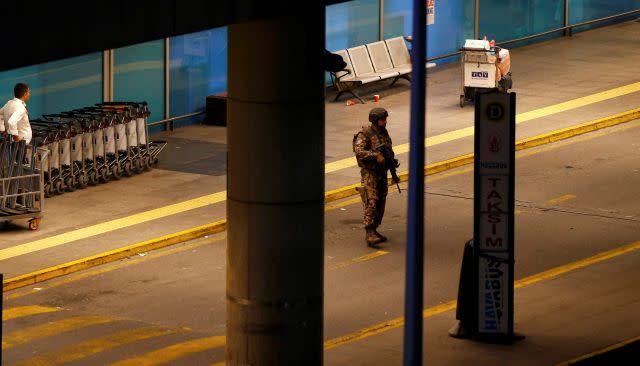There’s a common security blind spot at airports—and terrorists keep exploiting it

Airports are among the most heavily guarded public spaces. But this week’s deadly suicide attacks at Istanbul’s Atatürk International Airport and the March attacks at the departure hall at Brussels Airport showed, there are significant blind spots.
Security officials are particularly challenged to protect what’s known as landside areas—the places outside of security checkpoints that are open to the general public. They include crowded areas like departure and arrival halls, but also parking lots and curbside drop-offs.
Attackers in Istanbul’s airport reportedly entered the arrivals hall, a tough area to protect because it is designed to be a bridge between arriving passengers and transportation out of the airport. It is a hub of activity, home to ground transportation booking and pickup spots, hotel booking, shuttle desks, and currency exchange houses. How do you protect these public spaces?
Most airports do not even try.
The International Air Transport Association, an industry group that represents airlines, says that very few require passengers to pass security checks before entering terminal buildings. Security in the US and abroad intensified after the Sept. 11, 2001 attacks, but focus has mainly been on preventing attackers getting on-board airplanes. Six years ago, the US Transportation Safety Administration unveiled additional screening of passengers boarding international US-bound flights.
But there are some exceptions.
Cars headed to the airport in Nairobi have to stop for a search a kilometer from the main terminal because authorities on alert for attacks by Somali-based al-Shabaab militants, Reuters reported earlier this year. Airports in India and in Peru’s capital Lima also have tighter security than many other parts of the world, as authorities require passengers to have valid airline tickets and passports to enter the terminal where check-in counters are located. There is no milling about getting coffee for family and friends waiting in check-in lines.
Restricting access to terminals is aimed at choking off the public’s access to both aircrafts and large crowds of people to prevent crime and attacks.
Even Istanbul’s airport reportedly requires passengers traveling internationally to pass through two layers of security before making it to gates. “Atatürk was an obvious target, but on the face of it, not an easy one,” wrote Kylie Bull in IHS Jane’s Airport Review after the attack. But it still wasn’t enough.
This week’s attack in Istanbul is “an unfortunate reminder that this kind of additional security measures tends to move the target rather than actually securing it,” said the Airports Council International, adding that it was a grave reminder that “no security measures can ensure 100% protection.”
There are no easy answers. Requiring a checkpoint just to enter the airport won’t solve the problem, and can even simply create new targets, some analysts say. That’s because those new points could create additional targets: large numbers of people that are forced to wait until they pass the the check.
“You just establish another choke point,” said Jeffrey Price, a former Denver airport security official who teaches at Metropolitan State University of Denver. “You don’t want to put all those people out on the curb because then you’re exposing them to a car bomb.”
At stake is the convenience to which the global travel industry aspires, which has already been battling traveler anxiety about terror this year, versus the safety and security of those customers.
When long waits in airport security lines caused passengers to miss flights earlier this summer, US Homeland Security secretary Jeh Johnson said: “Our task is not only to keep passengers moving but to also, and most importantly, keep passengers safe.”

Sign up for the Quartz Daily Brief, our free daily newsletter with the world’s most important and interesting news.
More stories from Quartz:

 Yahoo Finance
Yahoo Finance 